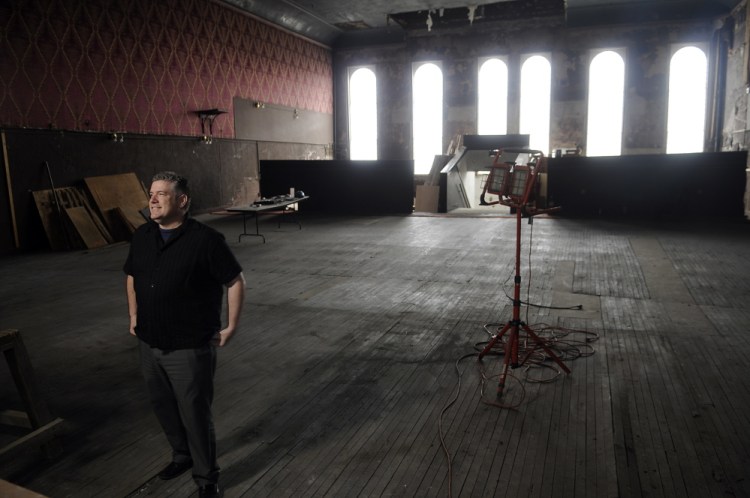GARDINER — Two significant milestones have been achieved in Mike Miclon’s plans for the Johnson Hall Performing Arts Center.
A capital campaign consultant has been hired to help orchestrate a fundraising campaign, and a gift to the center’s endowment now qualifies that fund to be invested and start earning income to support the center.
That keeps a second-floor renovation project on track to be completed no later than September 2019, a deadline that Miclon has been working for and remains confident can be met.
“I don’t think the public will stand for us to take any longer,” said Miclon, the center’s executive director.
When it’s done, the historic theater building will house two separate performance spaces — the small theater on the ground floor that already hosts performances, and a 400-seat theater on the top floor — the former opera house — that will feature the return of a full-sized stage and a balcony, and an elevator.
The to-do list between now and then is considerable, but it also contains some items that Miclon has been able only to think about before now.
“There’s a whole list of the never-befores, like hiring a consultant for the capital campaign, having a fully funded endowment and in January hiring a director of annual giving and sponsorship. That will make a huge difference,” he said. “It will show people we are raising money to further the success of the opera house long-term.”
Of the three, the fully funded endowment is furthest from completion, but it got a needed boost with a gift from former board member Paul Pidgeon.
“I knew that until the endowment fund had at lest $25,000 in it, we could not have management through the Maine Community Foundation,” Pidgeon said. “I felt that this was the best way to leave an appropriate gift that could keep on giving, so to speak. Also it would create a more recognized source for future donations.”
With Pidgeon’s gift bringing the endowment to $27,000, the Johnson Hall board voted this month to allow it to be invested.
“If you have a $1 million endowment, you can draw $40,000 a year to support the theater,” Miclon said.
Whatever is earned for now, though, will be reinvested into the principal to continue building the fund.
“Hopefully, as we raise money for the capital campaign, people can donate to the endowment fund as well,” he said.
Opus Advisors, of Portsmouth, New Hampshire, is now undertaking the groundwork needed to launch the campaign next year. Miclon said that includes pulling in information, crafting the components of the campaign and identifying prospective donors.
To keep on schedule, the capital campaign and construction will run on parallel tracks, Miclon said.
Miclon is also raising money by securing and selling historic preservation tax credits, both local and federal. That requires its own to-do list, including forming a for-profit entity to handle the transactions.
Before final plans can be drafted for the theater’s design, Miclon commissioned a report from Sutherland Conservation and Consulting in Augusta that he refers to as a forensic study of the building.
Amy Cole Ives, Sutherland’s president, said the historical analysis and rehabilitation recommendations are more like building archaeology, identifying what features are from what period. Repairs after a handful of fires and a couple of floods in the building’s 151-year history brought about some changes, but so did the changing times. Cole Ives said when the space was converted from a performance venue to a movie theater in the early 1930s, the stage was scaled back and the proscenium arch was moved.
“It’s funny how some obvious things are surprises,” she said.
A cross-section analysis of the plaster on the walls shows the work is from 1888, although the whimsical twig-and-flower design is what people think of as typical of that period.
The acoustic fabric installed as part of the movie-theater conversion, designed by Augusta architectural firm Bunker and Savage, still exists.
“It’s surprising it would be such thick fabric,” she said.
The report will influence the final design of the opera house, Miclon said, but it will also keep the project in compliance with the tax-credit program.
Jessica Lowell — 621-5632
Twitter: @JLowellKJ
Send questions/comments to the editors.



